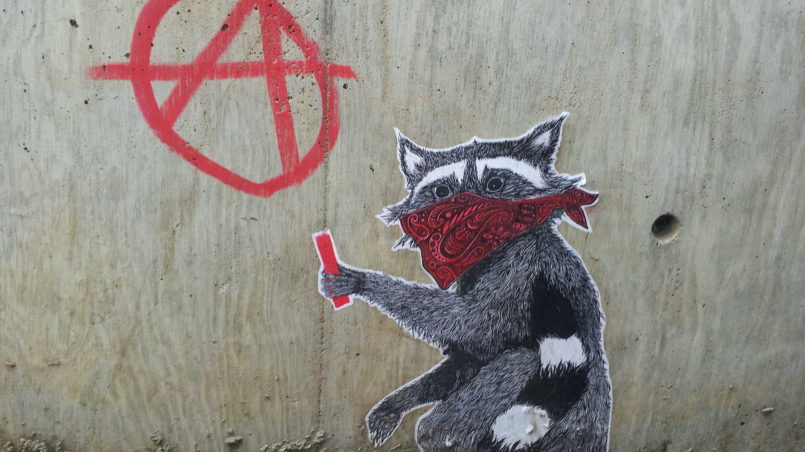Anarchy – a Misunderstood Concept

Anarchy is a word that evokes numerous negative connotations and is inseparably interwoven with chaos and danger. Be it in movies or newspaper reports, in the TV news or in books … Where anarchists are at work, something soon explodes, garbage cans and houses burn, windows are smashed and walls covered in graffiti. Yet anarchy – innocently enough – means nothing more than “the absence of rulership”.
What does anarchy mean and what is it confused with?
Anomy refers to the prevalence of chaos and destructiveness, a loss of order characterized by looting, violence and the breakdown of any structure. In short, the state that is falsely linked to the term anarchy.
Anarchy, on the other hand, means a social order, a system of self-organization, and thus pretty much the opposite of chaos. In sharp contrast to the existing system, however, an anarchic society is based on the voluntariness and co-responsibility of each individual. It is by no means about the absence of structure (otherwise only goods that can be produced independently would be available) or rules of conduct, but the absence of external domination. The incontestability of the individual’s personal freedom and thus, as a compelling, deepest principle also the respect for everybody else’s personal freedom are the mainstays of this worldview.
How does a real anarchist think?
Mind you, we are not talking about young troublemakers slapping that cool and infamous A-symbol onto their caps, let alone of bomb-makers who seriously believe that they can achieve a peaceful world order through violent acts. That can and will never work and, moreover, completely contradicts the spirit of the idea.
To function, anarchy requires self-responsibility, cooperation, consensus, and reason. The requirement goes beyond merely acting like adults and involves a generosity in thinking, a complex understanding that the well-being of the group corresponds to one’s own well-being – the obligatory civil or even military service as well as compulsory taxes and dues are unknown to anarchy. It does not prohibit anything that does not harm others, and it manages to do so with a minimum of rules (self-determined by each community) – more important than laws that are worked out to the last detail (and then circumvented) is the spirit of respect for one another. It is probably unnecessary to emphasize that as states of the world, as societies, and (with a few exceptions) as individuals, we are far from being able to handle such freedoms.
Still, it is interesting to ponder the following thoughts: on the one hand, people would steal, loot, and kill if state power did not prevent them … the majority of us are as sure of this as we are of the fact they we ourselves are decent persons without any criminal inclinations.
But then who are all these criminals we have to fear? In my opinion, it is precisely those who cannot be dissuaded now either, despite all the rules and police presence – and, mind you, mostly for reasons that would no longer exist in a world of voluntary sharing and mutual concern (see article The Barbarian within us and Punishment and Atonement – The Panacea for any Ailment?).
I am not saying that in a world without deprivation there would be no crime whatsoever – there will probably always be congenital mental illnesses as well as the pleasure in the forbidden. But the overwhelming majority, namely, the crimes committed as a result of destitution and abuse passed on for generations, would be eliminated.
Why does the system of voluntariness break down as soon as a group becomes too big to personally know all its members?
Considering how defenseless a single human being is and how little he could ever produce without the tremendous time savings of group advantages such as division of labor and specialization, it is clear that we have developed as a community and are endowed with the social skills needed to do so. However, our desire for fellowship, while going deep down into our genes, has evolved under circumstances that no longer exist today.
This regulation suddenly falls away as our groups grow larger than about 150 members, and in its place abstract concern for the common good would have to take over. Unfortunately (and perhaps inevitably), our mental development has taken quite a different path, which we shall examine in the next article.
Credits
| Image | Title | Author | License |
|---|---|---|---|
 |
Art_Anarchy. | Eekiv | CC BY-SA 3.0 |
